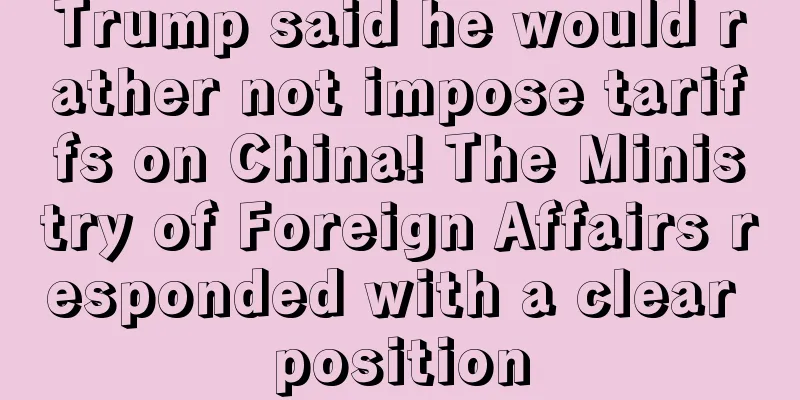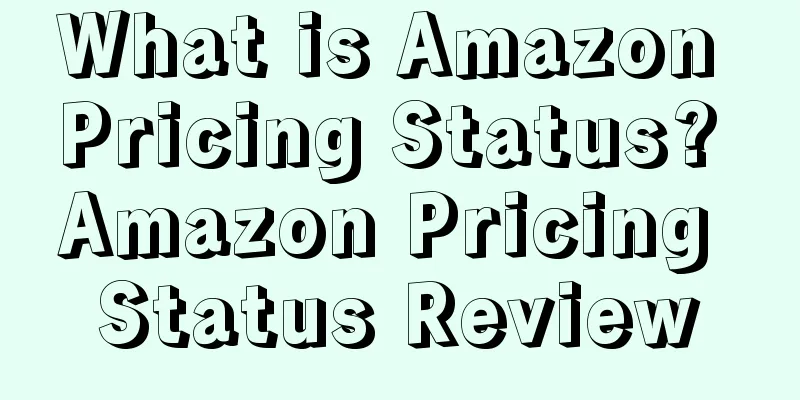Trump said he would rather not impose tariffs on China! The Ministry of Foreign Affairs responded with a clear position

|
It is learned that on January 24, according to foreign media reports, US President Trump said in an interview that tariffs are a "huge force" for the United States against China, but he also said that he would rather avoid using this means. It is reported that Trump emphasized in the interview that the United States can use tariffs to put pressure on China, and mentioned that tariffs are a "powerful power" of the United States. He also expressed confidence in reaching an agreement with China on fair trade, but did not disclose specific measures. In addition, he reiterated his previous tariff threat, saying that a 10% tariff may be imposed on Chinese exports from February 1 to deal with China's shortcomings in controlling fentanyl. Analysts believe that Trump did not immediately impose tariffs on China in the early days of his presidency, which was interpreted by the market as a positive sign. However, during his campaign, he proposed to impose additional tariffs of up to 60% on China. If implemented, this policy will have a serious impact on Sino-US bilateral trade and China's export-dependent economy. Although the recent tariff threat is milder than before, it still adds uncertainty to the economic and trade relations between the two countries. In response to the US tariff-related remarks, Chinese Foreign Ministry spokesperson Mao Ning responded at a press conference on January 22 that China has repeatedly stated its position, emphasizing that there are no winners in trade wars and tariff wars, and reiterated that China will firmly safeguard its national interests. The next day, Chinese Ministry of Commerce spokesperson He Yadong further pointed out that tariff measures are not beneficial to both China and the United States or the global economy. China advocates promoting the stable development of Sino-US economic and trade relations based on the principles of mutual respect, peaceful coexistence, and win-win cooperation. Trump frequently uses tariffs as the main tool in negotiations with China, which appears to be a tough stance, but in reality is more to cater to domestic voters and gain short-term benefits. In the future, whether the US will formally implement tariff measures and China's further response will have an important impact on the direction of the situation. Author ✎ Rayna/ Statement: This article is copyrighted and may not be reproduced without permission. If you need authorization, please contact: happy |
<<: Korean beauty products are sweeping the US market, accounting for 85% of Amazon sales in the US
>>: China strikes back! Imposing tariffs on some US imports
Recommend
Amazon is the most popular item on Thanksgiving Day, but Best Buy is the most popular item on Black Friday!
<span data-shimo-docs="[[20,"获悉,根据市场研究公司Nu...
What is MakeMyTrip? MakeMyTrip Review
MakeMyTrip is the largest and oldest online travel...
More than 90% of CE certificates are fake! Just now, the EU officially issued a warning...
Recently, the European Safety Federation (ESF), th...
Mexico: Halloween costume searches on Amazon increased 1,000%!
It is learned that October 31 is Halloween, and Me...
There are too many packages during the peak season! FedEx announces suspension of some refund guarantees!
FedEx Corp. has said it will suspend its refund gu...
Nothing else, this Double 12, N kinds of discounts, 1 to support you - EU Cross-border Circle
"Double Eleven has already passed . Are the D...
Walmart+ membership users increase to 59 million! Amazon Prime's position is threatened
It is learned that according to PYMNTS data, the p...
What is Guangzhou Zhongtian Cross-border Supply Chain Co., Ltd.? Guangzhou Zhongtian Cross-border Supply Chain Co., Ltd. Review
Guangzhou Zhongtian Cross-border Supply Chain Co.,...
Tariffs are higher than costs?! A big net is set up to trap Amazon sellers
As the dark horse site of Amazon last year, selle...
Walmart cooperates with Angi to launch new services to improve buyer satisfaction!
AM123 learned that Walmart has launched a new serv...
Amazon categories changed? Reviews deleted? Who is behind this?
Since the Review Policy was updated Friends have ...
Warehouse explosion intensifies! FedEx refuses to pick up FBA goods! Sellers are out of stock on a large scale
Logistics is destined to be a fatal link this yea...
Attention! Sellers can increase sales by adding this to the listing!
1. Amazon recommends sellers to add videos to list...
Shopify launches Moovly plug-in, allowing merchants to easily create product videos!
It is learned that according to foreign media repo...
What is Health Optimizer? Health Optimizer Review
Chongqing Health Optimization E-commerce Co., Ltd....









